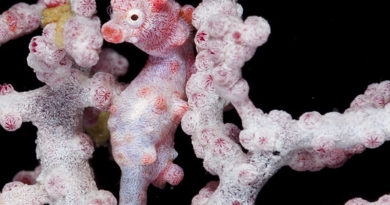The Evolution of Underwater Walking
Birds fly, fish swim. These are the stereotypical ways of locomotion of these large groups of animals. Generally that’s true, but biology is the science with the exceptions, and of the more than 18000 species of bony fishes, there are several which prefer to crawl.
The devil fish is a species of stonefish (yes, the very venomous ones) which prefers to walk, not swim. The fish uses the fin spines of its pectoral fins to push itself forward. The fish is negatively buoyant, hence it sinks and remains on the sand, but its weight is suspended by the denser seawater much more than it would be in air. Hence much of the energy the fish needs to use for crawling it needs to pull itself forward, not to prop itself up. The devil fish is neither swift nor inconspicuous ate crawling, but he progresses. The fish is a lie-in-wait predator, and swift pursuit is not something it needs.
Here is a video of the fish walking in Dauin in the Philippines:
The Limits of Convergence
Giving up swimming and taking up walking did not only happen in fishes.
There is a famous paper by Packard from 1972 titled “Cephalopods and fish: the limits of convergence.”. The paper argues that fishes (vertebrates; animals with a spinal cord; related to us) and squid+cuttlefish+octopi (mollusks; related to clams and slugs; only very very distantly related to us) are evolution’s solution to the same task: a mobile animal, often a hunter, with keen senses and large brains. Yes, large brains – few fishes have larger brains (per body size) than humans (some do!), but these are cognitively complex animals compared to everyone around them,like slugs, worms, corals or sea urchins.
The flamboyant cuttlefish is in this sense the equivalent to the devil fish; a walking animal, found at home in the muck habitats. The cuttlefish is poisonous, not venomous, but still, protected by noxious chemicals. Here you can admire the animal:
The Paper:
Packard, Andrew. “Cephalopods and fish: the limits of convergence.” Biological Reviews 47, no. 2 (1972): 241-307.
I hope you enjoyed this raving of mine,
Best Fishes,
Klaus


